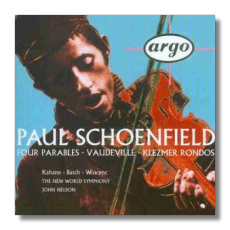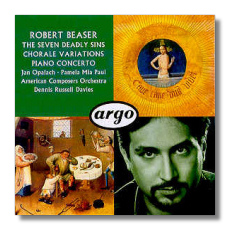
The Internet's Premier Classical Music Source
Related Links
-
Beaser Reviews
Schoenfield Reviews - Latest Reviews
- More Reviews
-
By Composer
-
Collections
DVD & Blu-ray
Books
Concert Reviews
Articles/Interviews
Software
Audio
Search Amazon
Recommended Links
Site News
 CD Review
CD Review
20th-Century Orchestral Works

Paul Schoenfield
- Four Parables *
- Vaudeville **
- Klezmer Rondos ***
* Jeffery Kahane, piano
** Wolfgang Basch, piccolo trumpet
*** Carol Wincenc, flute
New World Symphony Orchestra/John Nelson
Argo 440212-2 DDD 71:53


Robert Beaser
- Chorale Variations
- The Seven Deadly Sins *
- Concerto for Piano and Orchestra **
* Jan Opalach, bass-baritone
** Pamela Mia Paul, piano
American Composers Orchestra/Dennis Russell Davies
Argo 440337-2 DDD 77:06
Reissued as Phoenix CD162
Amazon
- UK
- Germany
- Canada
- France
- Japan
- ArkivMusic
- CD Universe
- JPC
When's the last time that a piece of music made you laugh out loud (works by Andrew Lloyd Webber not included)? I grinned my way through much of Paul Schoenfield (b. 1947) disc, but when he used a dour bit of Mahler's Second Symphony to segue into something like Variations on "Tico-Tico" (the bridge between the fourth and fifth sections of Vaudeville), I decided that this guy was seriously, wonderfully strange.
Schoenfield spent time at Carnegie-Mellon and University of Arizona (he holds degrees in both music and mathematics), not to mention an Israeli kibbutz. He gets an "A" for wit in my grade book, and not just for his irreverant skewering of Mahler. This is some of the most life-affirming new music that I've heard in quite some time. It's not all cheerful – in fact, the Corigliano-like Elegy from Four Parables is unmistakably grim – but it does support the hypothesis that our lives are nothing more than a cosmic Keystone Kops film that has pie-fights, head-clubbing, and it stimulates the comforting thought that all of us eventually are going… down?… up?, … wherever we're going, together.
These are concertante works. Four Parables for piano and orchestra blends shades of frenetic "Age of Anxiety" Bernstein with symphonic Gershwin to depict four incidents in the composer's life: existential dread (or better, wild silliness in the face of existential dread), an acquaintance's encroaching senility and stubborn lucidity ("Life is a tantamount to a burlesque show"), the death of a young friend who refused medical attention in lieu of fanatical religious rituals, and "Dog Heaven," a canine Paradiso with which the composer comforted two young children whose pet was taken away from them. Vaudeville, modeled on Schumann's Carnaval, is a droll concertino for the uncommon piccolo trumpet. The movements are titled "Overture," "Bear dance," "Klezmers," "Sketches" (a clown act, a sentimental ditty, a masque), and "Carmen Rivera." Klezmer Rondos, which also exists in a version for flute, baritone, and orchestra (recorded by New World Records), captures the weird, wailing, celebratory qualities of the klezmer band. All three of these works are immensely attractive and entertaining, and the performances are excellent. Special mention must be made of Miami Beach's New World Symphony, an always-exciting group comprised of the most talented young instrumentalists fresh out of music school. Wolfgang Basch's work in the demanding Vaudeville also stands out.
It hardly makes sense to criticize any artistic work from the late twentieth century for being too derivative; the end of this millenium practically is defined by its lack of originality. In other words, we shouldn't complain when a composer pays homage (or borrows, or frankly steals), unless he does so clumsily or in poor taste. Neither Schoenfield not Robert Beaser (b. 1954) have broken new ground with the works on these two discs, but the older composer's imaginative juxtapositions give the listener a provocative jolt. Beaser seems more self-impressed than Schoenfield, a dangerous trait in any individual unless he or she can deliver the goods in full. Beaser isn't quite there yet, and while his three works have many impressive things in them, their totalities don't convince me.
The Seven Deadly Sins is least convincing. This work shows some hazards of setting good poetry to music. I argue that epigrammatic poems require epigrammatic music, and that's not what we get here: while Anthony Hecht gets his point across in each poem in a handful of lines (the texts are taken from "The Hard Hours"), Beaser takes minutes. The composer alters the natural rhythm of the words, forces repeats on them, and tells us how to feel about them. My strategy for handling complicated poems is different from my strategy for handling complicated music. I can enjoy Hecht's words and Beaser's music, but not at the same time. My difficulties with the Piano Concerto are related to both form (two weighty movements followed by the brief postscript of a Rondo finale) and content (apparently, a neo-everything revisitation of the genre's cliches). This isn't a bad piece of music, but it does go all over the place, and the frequent use of quotations or near-quotations (Beethoven, Bernstein, and others) begs the question "What is the composer trying to say?" I don't feel as if the music answers this question. The best of these three works is Chorale Variations, based on the composer's own theme. Here, Beaser seems to be speaking for himself and with his own voice. The orchestral writing is tight and imaginative, and the interpretive difficulties that the listener experiences as the work progresses seem matched to the work's content. This is the piece I'll be coming back to the most. Performances are good (Davies and the ACO commissioned the Chorale Variations and Pamela Mia Paul commissioned the concerto), but the recording, made in New York's Manhattan Center, is not ideally transparent.
Thumbs up for Schoenfield, wait and see for Beaser.
Copyright © 1996, Raymond Tuttle



















